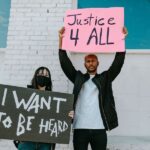
Photo courtesy of the National Register of Historic Places and National Historic Landmarks Program Records: Georgia
The University of Georgia School of Law’s First Amendment Clinic successfully defended the right of four homeowners in Atlanta’s Lakewood Heights Historic District to speak on matters of public concern affecting development in their neighborhood. These neighbors, who include Heather Graybill, Paula Kupersmith, and Zachary Murray, were sued by Atlanta landlord Omar Ali for engaging in speech and petitioning that did not support his development interests. After the court dismissed multiple claims in response to the homeowners’ motion to strike the lawsuit as a Strategic Litigation Against Public Participation (SLAPP) suit, Ali voluntarily withdrew the rest of his lawsuit.
The future of Lakewood Heights Elementary School was at the heart of the controversy giving rise to the neighbors’ public participation and Ali’s efforts to silence them. Built around 1915, and remodeled in 1932, the school is owned by Atlanta Public Schools (APS), but has been vacant since 2004 and was declared a “surplus” property in 2007.
Ali asserts that he had meetings with APS in 2020 and 2021 about his proposal to purchase Lakewood Elementary. However, in January 2022, APS slated the school for demolition. In response to outcry from city planners and the Atlanta Urban Design Commission, APS quickly abandoned this plan and publicly stated that the district would further evaluate and determine what to do with Lakewood Elementary while continuing to take into consideration the interests of the community. Later that year, the four neighbors engaged in public comment at public meetings, organized an online petition, and went door-to-door canvassing their neighbors, all aimed at urging APS to retain ownership of the historic school and to seek community input about its use or disposition. The neighbors advocated for rehabilitating the school for the public good, such as converting it to an early childhood learning center or affordable housing units.
Ali had wanted to purchase Lakewood Elementary for commercial development purposes, although at no time since declaring the school surplus did APS or the Atlanta Board of Education ever vote to sell the school, or put the property on the market. Rather, after scrapping its demolition plans, APS announced in 2023 that it would be partnering with the Atlanta Urban Development Corporation for the historic redevelopment and long-term lease of Lakewood Elementary. The following year, Ali sued the four neighbors alleging defamation, libel, and tortious interference.
The four neighbors moved to strike the lawsuit under Georgia’s anti-SLAPP statute, which creates a procedure for early dismissal of a lawsuit that is lacking in merit and has been filed for the purpose of chilling or silencing speech on matters of public interest or concern. Courts recognize that a textbook SLAPP lawsuit involves a developer suing neighborhood activists for having spoken out against the developer’s project in a public forum.
The Fulton County State Court ruled that all of the neighbors’ speech at issue in Ali’s lawsuit falls within the protective scope of the Georgia anti-SLAPP statute. The court dismissed the defamation claims against all four of the neighbors, dismissed all libel claims against Graybill, and dismissed the request for a gag order on the neighbors’ future speech. Two days after the court issued its order, and aware that the neighbors intended to seek dismissal of the remaining claims via an immediate appeal, Ali withdrew his lawsuit by filing a notice of voluntary dismissal.

The Issue
Defamation Defense
Defamation is a false statement of fact that harms the reputation of a person, business, or organization. Journalists, news organizations, and even ordinary people can be sued for defamation, which is a common tactic to chill or silence legitimate speech and criticism. Read more about our defamation defense work here.
Explore Issue
The Issue
Free Speech
The First Amendment protects the right of private individuals to engage in speech and expression without being censored or punished by the government because of their viewpoint. While the government may constitutionally regulate the time, place, and manner of private speech in public forums it must do so in a viewpoint-neutral manner and, depending on…
Explore Issue